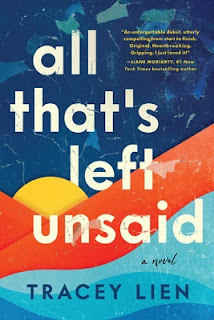As I continue to work my way through my toppling summer reading TBR, I’ve been trying to prioritize works by my favorite authors first and foremost. Last week, I finished the latest new release by Liz Moore (which I loved) and this week, it’s Kate Quinn’s turn. I’ve read and loved most of Quinn’s 20th century historical novels and her newest work, The Briar Club, is of course no exception. This time around, Quinn takes on 1950s America at the height of McCarthy’s Red Scare, with both the Korean War as well as the aftermath of WWII playing minor roles in the backgrounds of a few of the characters. At the center of the story is the Briarwood House, an all-female boardinghouse in Washington D.C., where, on Thanksgiving Day 1954, a murder has just taken place and the police are on-site investigating. As the police get ready to interview witnesses (of whom there are many – the tenants of the boardinghouse as well as various friends and relatives), we are taken back through the past 4 years leading up to this point, starting from the day that mysterious widow Grace March moves into the closet-like room on the top floor and starts a Thursday night supper club that ends up drawing her eclectic mix of neighbors together.
The structure of the story is a unique one – in between a narrative that alternates between the perspectives of each of the characters where we learn their varying backstories, there are short interstitial sections that return us again and again to the present storyline in 1954, each time revealing more clues about the murder currently being investigated. All these threads converge into an unexpected plot twist in the end that actually had me going back through some of the chapters trying to understand how I missed some of the clues that were staring me in the face. Also, one of the things I found different about this novel compared to Quinn’s previous ones is that the historical elements were more subtle, blended seamlessly into the various characters’ backstories to the point that you kind of have to pay close attention in order to notice them. In this regard, Quinn’s Author Note – which she deliberately puts at the end of the book because it reveals spoilers from the story – is a must-read, as it provides much of the historical context for both the story as well as the characters.
Those who’ve read Quinn’s previous historical novels will notice that she went in a slightly different direction with this one (both story and structure-wise), but one aspect that’s a constant with her works is the focus on strong yet flawed female protagonists and the friendships (as well as rivalries) that are formed as the story progresses. It is also worth mentioning that the tone of this novel overall is much lighter than that of Quinn’s past works, with some subtle humor interspersed throughout the story that is not usually present in her other novels. The biggest indication of this, in my opinion, exists in the interstitial sections from the “present” 1954 timeline, which are all told from the perspective of the Briarwood boarding house (yes, you read that right – the house actually narrates those portions of the story) in contrast to the rest of the chapters which are told from the actual characters’ perspectives. I found this narrative structure quite interesting and in this case, it worked well for the story that Quinn was trying to tell.
I definitely enjoyed this one, though admittedly, it’s not my favorite of Quinn’s novels (which has more to do with me than her, as this particular historical setting – 1950s America, specifically Washington D.C. amidst McCarthyism – is one that I’ve never been too keen on). With that said, the writing is brilliant (as expected), but what blew me away the most is how Quinn wrote her characters – every single character has a distinctive personality as well as a unique backstory to match, yet the way the characters interact with each other when they come together as a group felt so natural. These are characters that, when I got to the end of the story, I honestly did not want to part with and would’ve absolutely been happy reading more about them -- if Quinn ever decides to continue any of these characters’ stories in future works, I am totally there for it!
Received ARC from William Morrow via NetGalley.















